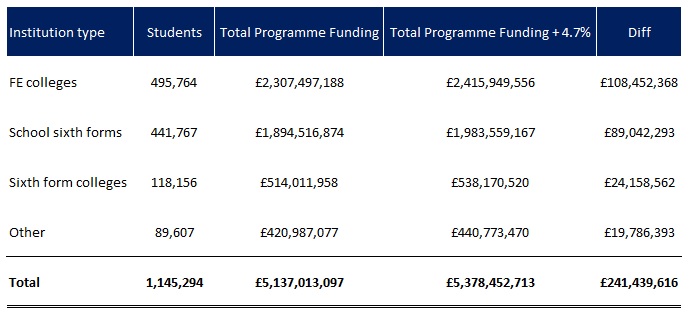After mounting pressure (from all quarters) to invest in further education, the new chancellor today announced an extra £400 million for further education in the next financial year. Nick Linford crunches the numbers to see just how big a deal this is, starting with the rise in the base rate.
The Treasury took the lead in announcing this morning that for 2020/21 there would be an additional £190 million to increase the funding base rate. The Department for Education then told FE Week that this meant the £4,000 rate would increase to £4,188, which is a 4.7 per cent increase – a first since the base rate was introduced as part of a new per learner funding methodology in 2013.
- The £190 million (financial year) is likely to be worth £250 million for the 2020/21 academic year
The £190 million “covers the financial year 2020-21” says the Treasury, which runs from 1 April 2020 until the 31 March 2021. However, the rate change is expected to apply to the 2020/21 academic year, which runs from 1 August 2020 until the July 2021. So, the £190 million is likely to run from August 2020 (start of academic year) until 31 March 2021 (end of financial year), which is 8 months (67 per cent) of a full academic year. If the £190 million were extended for a further 4 months (an extra 33 per cent), it would be worth around £250 million.
- Possible all funding bands increased by 4.7 per cent, but we may not know until December
The Department for Education refused to comment on whether all the funding rates, such as the £3,300 rate for full time 18 year-olds would also increase by 4.7 per cent. It is likely the ESFA is waiting to see what recruitment patterns look like this academic year and as is the norm, confirm the funding bands in December prior to setting allocations. However, working on the basis that the academic year cost is £250 million (see above) then this seems possible. See analysis below:
The ESFA publish 16-19 allocations, which includes a column for ‘Total Programme Funding’. The funding formula for programme funding is based on multiplications, so an increase of 4.7 per cent to the unweighted base rate equates to a 4.7 per cent increase to the ‘Total Programme Funding’.
The allocations for 2018/19 are as follows and I’ve added 4.7 per cent.

So as you can see, increasing programme funding by 4.7 per cent would cost close to £250 million, which is what I would expect based on the £190 million announcement to represent the first eight month of the 2020/21 academic year.
- FE colleges could benefit to the tune of £300 million in 2020/21
Based on the figures above, FE colleges would receive nearly half of the extra funding for the base rate increase. However, it is well worth noting that the Treasury announcement included “£120 million to help deliver expensive but crucial subjects such as engineering” along with £35 million more to support students at level 3 who failed their English and maths. Given the types of courses and student profile at FE colleges, I would expect them to receive nearly all of this £155 million. Perhaps the most interesting thing about the total package of £400 million is that this £155 million (nearly half) is clearly targeted to support FE colleges rather than sixth form schools or sixth form colleges. And if we assume this extra £155 million is for the financial year and written into the funding formula, then it would be worth just over £200 million for the academic year. After taking off a £10 million estimate for a small number other institutions benefiting and including the 4.7 per cent base rate rise to all rates, this makes for around £300 million extra for FE colleges.
- Average FE college could see 12 per cent more 16-19 funding but just 4.5% more income overall
As the ESFA figures above show, FE colleges are allocated around £2.4bn each year for 16-19 year-olds. So £300 million represents an increase of approximately 12 percent – not insignificant at all. We’ve yet to see the detail on how the £120 million for “expensive but crucial subjects” will be determined – presumably via the programme weighting within the funding formula – but obviously this will vary the percentage increase for colleges depending on their course mix. Also, those colleges delivering T Levels are likely to see their budgets swell – although this will no doubt come with an increased cost for more teaching and initial development.
So an average increase of 12 percent does seem significant, but remember that 16-19 funding is not the only income stream for colleges.
The ESFA publish a spreadsheet with the accounts for FE colleges, most recently for 2017/18, which includes a column for “Total income”, which comes to nearly £6.7bn, or £6,679,218,000 to be exact. So 16-19 funding for FE colleges only represents around a third of their total income.
If FE college income was increased by £300 million to nearly £7bn, the 12 percent rise for 16-19 income falls to a 4.5 percent rise for total income.
And again, depending on the mix and balance of the learners and courses at the FE College, their increase could be more or less than the 4.5 per cent average.
- Does this mean colleges can afford to award pay rises?
If total income does rise by 4.5 per cent then possibly. I think a college that hasn’t awarded a pay-rise for many years will struggle to justify not at least considering it now, based on the increases to the base rate and programme weightings. However, firstly, it is worth remembering the increases only kick in from August 1, 2020 (nearly a year from now). Secondly, there are rising expenditure pressures, such as inflation and pensions along with other variables (e.g. utilities, bank repayments and higher inflation in future) which I am sure will make finance directors question whether a pay rise right now would be affordable in the longer term.
Colleges will still need to focus on the basics, like keeping the classrooms full, to pay the bills.
- Is the base rate rise enough?
It is important to remember that the 4.7 percent extra on the base rate comes after 7 years of no increase – so it really represents only a year or two of rising costs.
To substantially make a difference to the ability of colleges to pay staff more and even return to teaching at least 36 weeks per year for more than 3 days per week, then the base rate for 2021/22 really needs to be much closer to £5,000 – as per the lobbying from both the Association of Colleges and the Sixth Form Colleges association.













